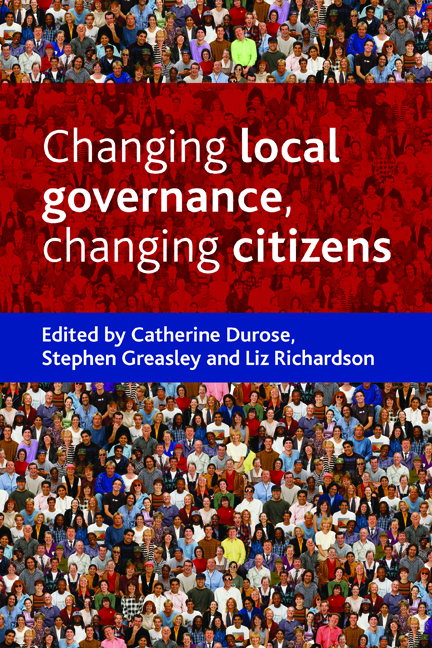Book contents
- Frontmatter
- Dedication
- Contents
- List of boxes and tables
- Acronyms
- Notes on contributors
- Acknowledgments
- Foreword
- Preface
- one Changing local governance, changing citizens: introduction
- two Citizen governance: where it came from, where it’s going
- three ‘Neighbourhood’: a site for policy action, governance … and empowerment?
- four Urban housing market restructuring and the recasting of neighbourhood governance and community
- five Citizen aspirations: women, ethnicity and housing
- six Can we promote cohesion through contact? Intergroup contact and the development of community cohesion
- seven New migrants, citizenship and local governance: ‘Poles’ apart?
- eight Citizens of faith in governance: opportunities, rationales and challenges
- nine Citizens’ reflections on behaviour change policies
- ten Every child’s voice matters?
- eleven e-citizenship: reconstructing the public online
- twelve Conclusion
- Index
four - Urban housing market restructuring and the recasting of neighbourhood governance and community
Published online by Cambridge University Press: 16 July 2022
- Frontmatter
- Dedication
- Contents
- List of boxes and tables
- Acronyms
- Notes on contributors
- Acknowledgments
- Foreword
- Preface
- one Changing local governance, changing citizens: introduction
- two Citizen governance: where it came from, where it’s going
- three ‘Neighbourhood’: a site for policy action, governance … and empowerment?
- four Urban housing market restructuring and the recasting of neighbourhood governance and community
- five Citizen aspirations: women, ethnicity and housing
- six Can we promote cohesion through contact? Intergroup contact and the development of community cohesion
- seven New migrants, citizenship and local governance: ‘Poles’ apart?
- eight Citizens of faith in governance: opportunities, rationales and challenges
- nine Citizens’ reflections on behaviour change policies
- ten Every child’s voice matters?
- eleven e-citizenship: reconstructing the public online
- twelve Conclusion
- Index
Summary
Introduction
Housing has long been recognised as crucial in influencing patterns of social interaction and community formation in the UK. The late 1990s witnessed the growth of a stark national imbalance with ‘overheated’ housing markets in the South of England and ‘low demand’ for housing in parts of the North. The policy response to the issue of low demand was to create a Housing Market Renewal (HMR) programme, whose central task was to restore sustainability to inner urban housing markets. The approach adopted by most of the nine HMR ‘Pathfinders’ was to seek to transform affected neighbourhoods – essentially a process of outward-looking and strategic restructuring/ re-envisioning of the fundamental rationale for neighbourhoods and places – with reference to the parallel process of urban economic restructuring. Equally central to restructuring was the aim of bringing new (wealthier, economically active) residents into such neighbourhoods, an aim that stems from a number of related rationales, to ostensibly create what, in central government parlance, are often termed ‘mixed communities’.
The problem of ‘low demand’ for particular housing types and neighbourhoods emerged in the late 1990s and was manifested in very low house prices, dereliction and in some cases near abandonment of neighbourhoods in the inner urban parts of most major cities in Northern England and the Midlands (Nevin et al, 2001). Growing alarm in housing practitioner circles was allied to research by academics and consultants, creating an ‘evidence base’ for a policy response (Holmans and Simpson, 1999; Nevin et al, 2001). Low demand for housing was understood as resulting from a combination of demographic changes (regional migration, suburbanisation and counter-urbanisation) flowing from economic restructuring, as well as, more controversially, the argument that there have been changes in residential preference, in particular away from traditional pre-1918 terraced housing to larger modern dwellings with gardens (Cameron, 2006). Nine HMR Pathfinders were established after funding was announced in the 2002 Comprehensive Spending Review and the policy was launched in the Sustainable Communities Plan (ODPM, 2003).
This chapter draws on extensive empirical research conducted around the HMR process in East Manchester between 2004 and 2008 (Rees, 2007; Durose and Lowndes, 2008). East Manchester has seen intensive regeneration activity since the mid-1990s, including HMR activity.
- Type
- Chapter
- Information
- Changing Local Governance, Changing Citizens , pp. 53 - 70Publisher: Bristol University PressPrint publication year: 2009



